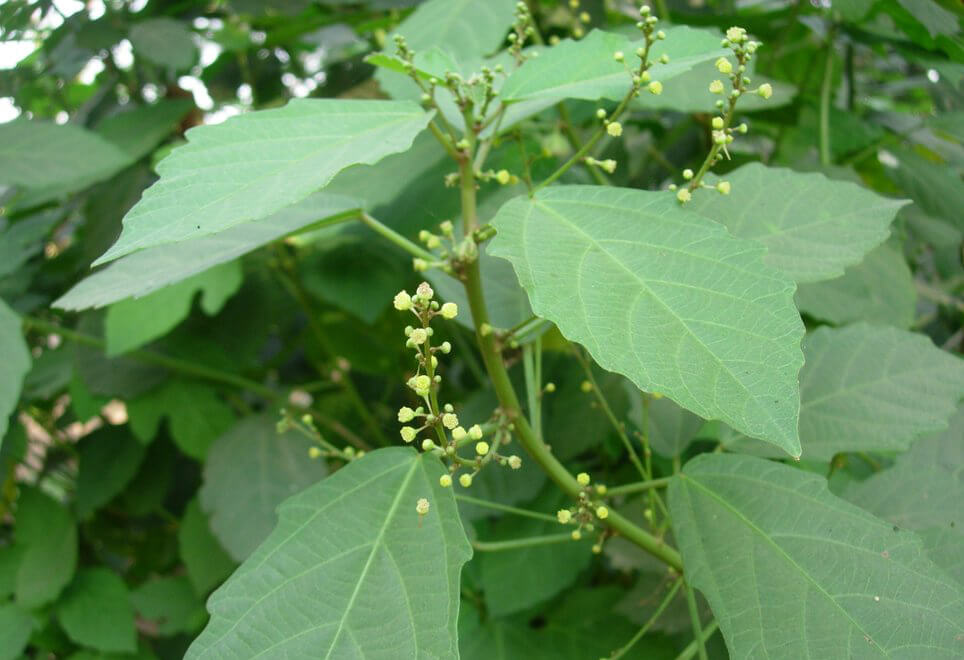Danti (Baliospermum montanum) is monoecious and stout undershrub that grows up to 1.8mt in height. This plant has herbaceous branches that are arising from the roots. Upper branches bear small lanceolate leaves and lower branches have 3-5 lobed large, simple and sinuate-toothed leaves.
Flowers are unisexual and are numerous arranged in axillary racemes. Male flower’s calyx is round, membranous, long and finely mottled with 5-6 disc glands. Female flowers are small, hairy and have ovate and lanceolate sepals. Fruits of this plant are three lobed capsules. Seeds are mottled, smooth and contains oily endosperms. Flowers appears in month of January and February and fruits appears one month later.
Habitat
Danti is widely distributed throughout the sub Himalayan tracts from khasi hills to Kashmir. It is easily available in Bengal, Bihar, Madhya Pradesh and peninsular India.
Classification
Vernacular Names
- Latin– Baliospermum montanum
- English– Red physic nut, Wild castor, Wild croton
- Hindi– Danti, Hakum, Hakun
- Bengali– Danti, Hakun
- Gujarati– Dantimul, Jamalgota
- Marathi– Danti
- Telugu– Ettadungida, Kanakapata
- Tamil– Kattamaraku, Niradimutta
- Malayalam– Dantika, Katalavanakku, Nagadanti
- Oriya– Donti
- Burma– Natcho
- Persian– Bedanjirekhatai
- Arabic– Habbussalantinebarri
Ayurvedic Properties
|
Hindi / Sanskrit
|
English
|
|
Rasa
|
Katu
|
Taste
|
Pungent
|
|
Guna
|
Guru, Tikshna
|
Physical Property
|
Heavy, Sharp
|
|
Virya
|
Ushna
|
Potency
|
Hot
|
|
Vipaka
|
Katu
|
Metabolic Property
(After Digestion)
|
Pungent
|
Effects on dosha
It balances pitta and kapha dosha.
|
Charak Samhita
|
Sushrut Samhita
|
Vagbhata
|
- Bhedniya – Herbs used in purgation
- Moolini dravas – Herbs having roots as mainly used part.
|
Shamayadi, adhobhaghara
|
Shamayadi
|
Practical Uses of Danti (Baliospermum montanum)
- Danti is blood purifier and paste of danti roots and seeds are used to reduce edema and pain. Both act as analgesics to relieve pain.
- This herb has antipyretic properties and used to treat fever. This herb is also anti-inflammatory and used to reduce inflammation. Decoction of danti is used in pittaj jawara.
- Roots are laxative and highly purgative in nature. Seeds and root powder of this herb is used to relieve constipation and it is best used for patients of piles.
- Danti leaves are found to be very beneficial for the sufferers of jaundice.
- Decoction of Leaves are used to treat asthma and bronchitis by pacifying kapha dosha. Paste of danti leaves are applied for quick healing of wounds.
- Externally seeds of danti are used as stimulant and rubefacient. This herb is very effective in abdominal pain, bloating and abdominal tumors.
- Roots of this herb are pungent, heating and diuretic in nature. It is also used in hemorrhoids, abdominal tumors and enlarged spleen.
- External use of root paste over pile mass causes reduction in pain, swelling and shrinkage of pile mass.
- Seed oil of danti is very effective in treating vata disorders like paralysis, sciatica, gout and neurological disorders etc.
- Seed paste is also applied in poisoning of snake bites.
- Danti is used to pacify pitta and kapha dosha.
Parts Used
Dosage
- Root powder – 1-3gm
- Seed powder – 125-250mg
- Seed oil – 3-5 drops
Cautions
- It is not recommended in pregnancy and lactation.
Overdose may cause severe pain, nausea, diarrhea and vomiting.



